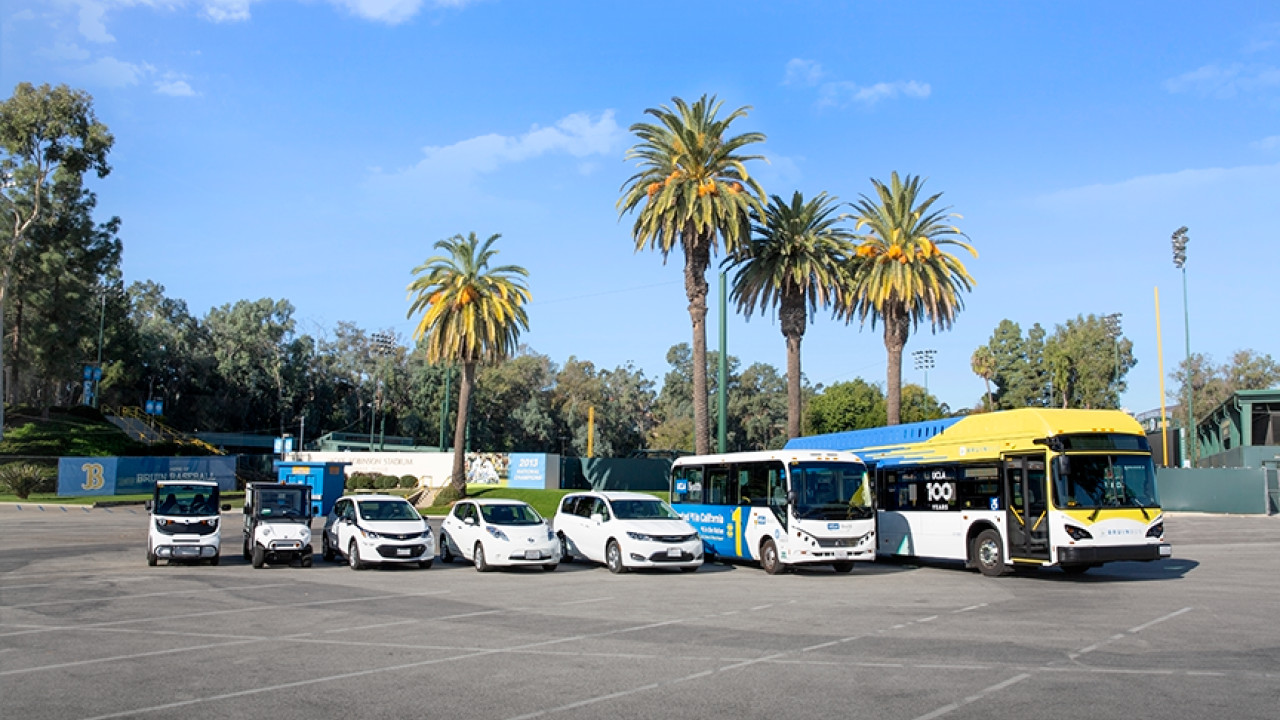Starting July 1, 2020, UCLA Transportation implemented a UCLA wide protocol requiring all University vehicles (as defined by BUS-46) to be equipped with telematics.
To maximize the benefits from telematics, UCLA Transportation has switched from its previous provider to Geotab. Geotab offers extensive vehicle monitoring beyond the standard mileage and location tracking (GPS), such as monitoring idling, accident reconstruction, maintenance/engine alerts and tracking charge levels for battery electric vehicles (BEV) and plug-in hybrid electric vehicles (PHEV).
To assist in outfitting all University vehicles with telematics while minimizing the financial impact on departments, UCLA Transportation was approved for $135,000 in Be Smart About Safety (BSAS) funding to purchase and install telematics devices. That funding will allow for over 800 vehicles to be outfitted with telematics devices with no charge to the vehicle’s department.
Optimizing Preventative Maintenance
One of the ongoing benefits of implementing telematics in a fleet is the data provided on the vehicle’s overall health and performance. Using this data, UCLA Transportation’s automotive experts can not only optimize preventative maintenance, reducing lifetime maintenance costs, but they can receive direct engine notifications to address potential maintenance issues sooner. Engine notifications allow repairs to be planned with less downtime, which could save the University over $122,000 per year if downtimes were reduced by as little as 2.4% - or 6 hours per vehicle per year. One guaranteed way to reduce unnecessary downtime is the continuous Smog testing program which removes the need for vehicles to be pulled out of service for Smog testing.
Reducing Loss from Theft & Accidents
Studies have shown that vehicles with telematics are less likely to be targeted for theft as the risk of being caught by police substantially increases. In instances of stolen vehicles recovery rates are not only greater for vehicles with telematics, but the vehicles are found faster and in better condition than vehicles without telematics.
After an accident occurs telematics can provide detailed information on a vehicle’s speed, trajectory, the exact time and location of the accident and what part of the vehicle was impacted. Insurance and Risk Management (IRM) can use this information to resolve claims faster and possibly use the details in UCLA’s favor.
Increase Safe Driving
Telematics devices often lead to a reduction of aggressive driving and speeding, while making it easier to put in place deterrents for erratic or dangerous driving habits. Beyond prioritizing the safety of drivers, passengers and pedestrians, there are also financial reasons to focus on promoting safe driving. Aggressive driving increases the wear-and-tear on a vehicle, especially the vehicle’s tires and brakes, and can significantly increase fuel consumption.
Reducing Vehicle Idling
Vehicle idling, or when a vehicle’s engine is on but the vehicle remains stationary, is a serious issue both financially and environmentally. Idling leads to pointless fuel consumption, which contributes to both fuel expense and the emission of CO2 a main greenhouse gas (GHG). UCLA Transportation has estimated that a 10% reduction in fuel consumption from reduced idling would result in an overall reduction of CO2 by 370 metric tons, and an estimated fuel savings of $117,971 per year.
The Geotab telematics devices will alert UCLA Transportation and vehicle operators to incidences of idling, allowing us to make operational adjustments to reduce idling, saving money and reducing our total GHG emissions campus wide, saving money and reducing our total GHG emissions campus wide.
Improving Vehicle Replacement Planning
Detailed information on the health, performance and utilization of a vehicle allows UCLA Transportation to accurately assess which vehicles are the best candidates for replacement. In addition, Geotab has an analytical tool that identifies vehicles that are good candidates to be replaced by BEVs and PHEVs. The GPS features of telematics can further support the transition to electric vehicles by leveraging vehicle parking information to improve infrastructure planning, such as the placement of vehicle chargers. The emphasis on electric vehicles is particularly important as UCLA Transportation has committed to purchase net-zero carbon emission fuel vehicles under the UC-wide Carbon Neutrality Initiative (CNI).
Requiring all University vehicles to have telematics will generate data that can be leveraged to improve fleet management and ultimately reduce costs to the University. Through the implementation of telematics and its range of benefits, UCLA Transportation estimates UCLA will save over $460,000 a year. The data collected will also help departments streamline their services and further reduce their total operating costs. Telematics is a key step for UCLA Transportation as part of achieving the University’s common goal of fiscal responsibility, sustainability, and safety.






